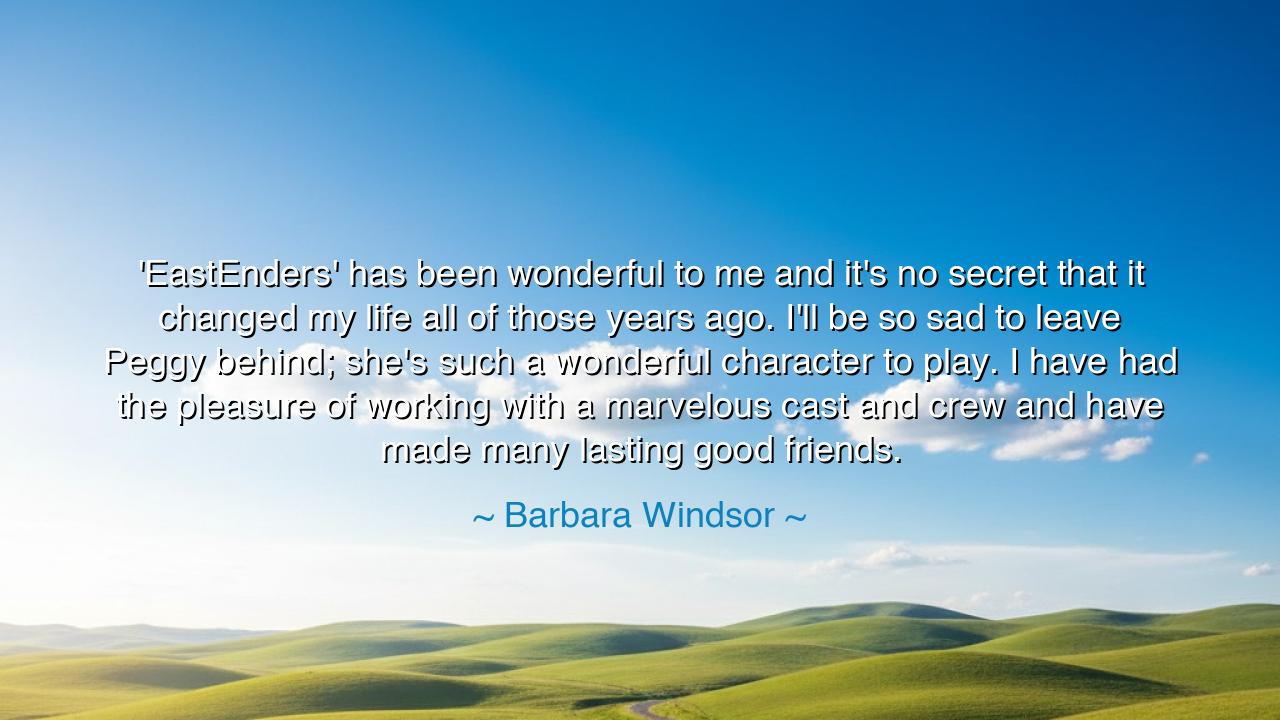
'EastEnders' has been wonderful to me and it's no secret that it
'EastEnders' has been wonderful to me and it's no secret that it changed my life all of those years ago. I'll be so sad to leave Peggy behind; she's such a wonderful character to play. I have had the pleasure of working with a marvelous cast and crew and have made many lasting good friends.






Barbara Windsor, with the warmth of gratitude and the ache of farewell, once said: “'EastEnders' has been wonderful to me and it's no secret that it changed my life all of those years ago. I'll be so sad to leave Peggy behind; she's such a wonderful character to play. I have had the pleasure of working with a marvelous cast and crew and have made many lasting good friends.” In these tender words, she speaks not only of art and career, but of the sacred bond between a soul and the story that shaped it. For when one devotes heart and years to a creation, it ceases to be mere work—it becomes a chapter of the self. To leave behind a beloved role is to bid farewell to a part of one’s own spirit.
The ancients would have understood this well, for they too revered the power of identity woven through art. When an actor, poet, or craftsman gives themselves wholly to their craft, the line between the maker and the made dissolves. Windsor and Peggy, though not the same, shared a heartbeat. Through years of performance, they became mirrors to one another: the actress lending life, the character giving legacy. Such is the alchemy of creation—it transforms both creator and creation until each is forever changed. And when the time comes to part, the sorrow is not for loss alone, but for the beautiful completion of a cycle.
Consider the tale of the great sculptor Michelangelo. When he finished shaping the statue of Moses, he is said to have struck it in the knee, crying, “Now, speak!” for the figure seemed so alive he could not bear its silence. So too does an artist who must part with their creation feel the sting of departure. Windsor’s sorrow echoes this ancient longing—to breathe life into something so fully that its absence feels like a silence after music. In her leaving, she honors not only the character of Peggy, but the power of every role to change the one who inhabits it.
There is also a deeper truth within her gratitude: that even great journeys are not walked alone. She speaks with reverence for the marvelous cast and crew, those unseen hands who make the illusion real. In this, she reminds us that every masterpiece, whether on stage, screen, or life’s own theater, is born not of one soul, but of many moving in harmony. This humility is a lesson for every generation—that no light shines without others tending its flame.
But most poignant of all is her reflection that EastEnders changed her life. Change is the pulse of existence; it spares no one, not even those who seem immortal on the stage. What was once new becomes memory; what was once role becomes history. Yet Windsor does not speak in bitterness. She speaks in reverence. Her words teach us that endings, though painful, are not punishments—they are the price of having lived deeply. To love something enough to mourn its passing is to have lived with true devotion.
Let the listener understand: to build, to create, to give oneself wholly is to risk sorrow, but it is a sorrow that purifies. For the artist who leaves her character behind, the teacher who says farewell to students, the parent who watches a child step into the world—all share this ache. Yet from this ache blooms meaning, for the heart that feels sorrow has known love. And the life that knows both love and loss is a life that has fulfilled its purpose.
Thus, Barbara Windsor’s farewell becomes more than a personal goodbye—it becomes a teaching for all who create, serve, and love. Do not cling to what must be left behind, but bless it for having shaped you. When the curtain falls, bow not in regret but in gratitude. Remember the friends you made, the lessons you learned, the souls you touched. These are the true treasures of any journey.
So, to those who follow, take this wisdom: cherish your roles, but do not become their prisoner. Give your heart freely, but when the hour of parting comes, release it with grace. For as Windsor herself shows, to love deeply and to let go gently—this is the mark of one who has lived nobly. And even when the stage grows dark, the light of such a soul continues to shine in the memory of all who witnessed its brilliance.






AAdministratorAdministrator
Welcome, honored guests. Please leave a comment, we will respond soon